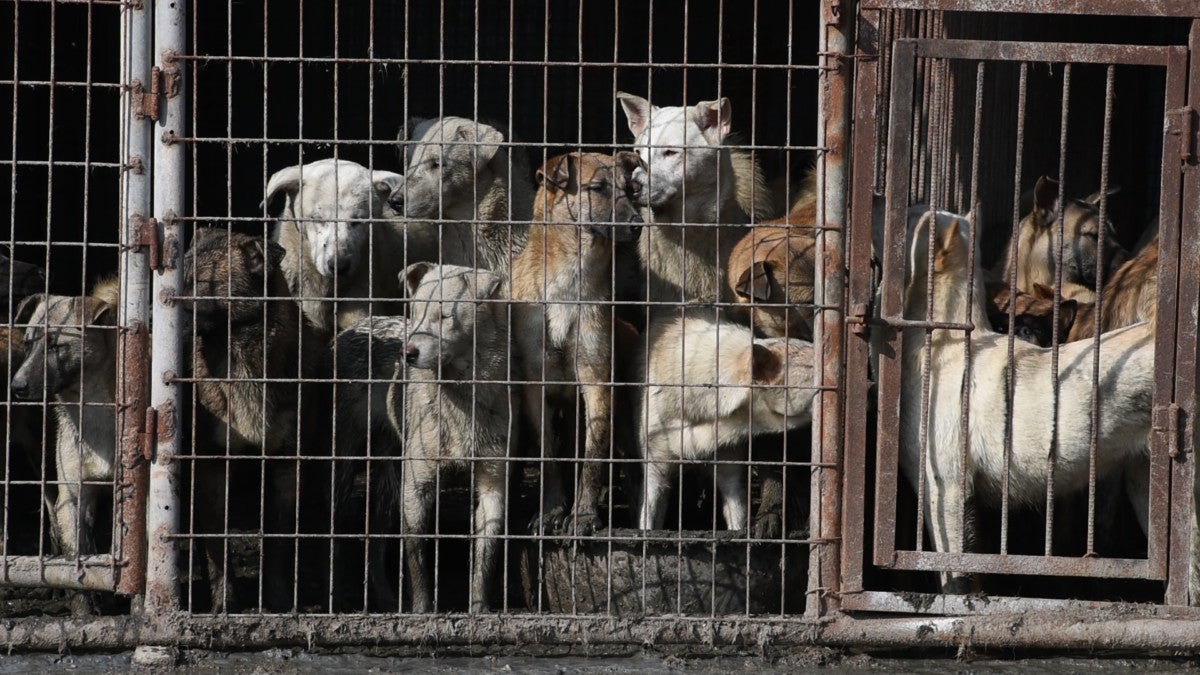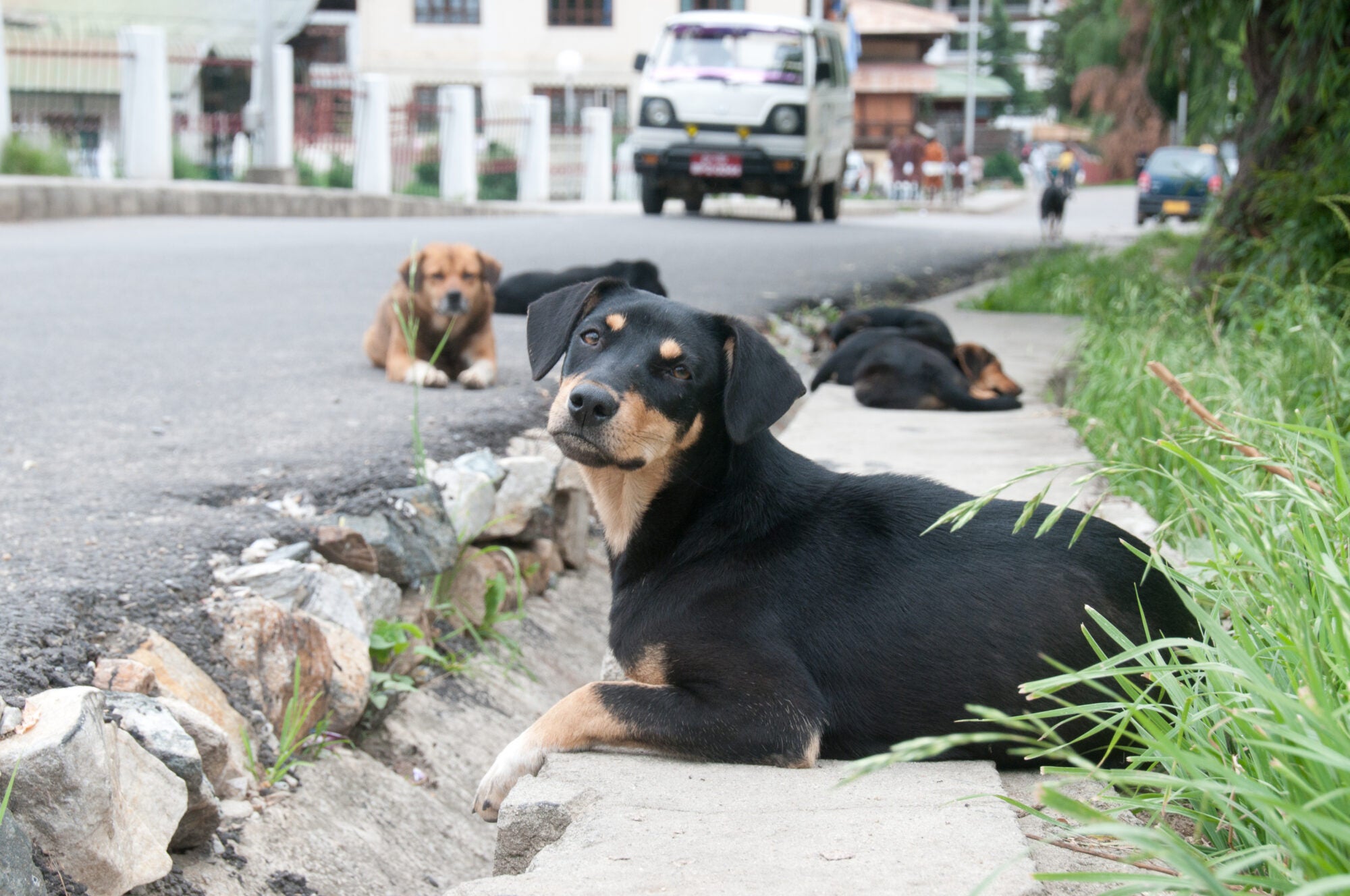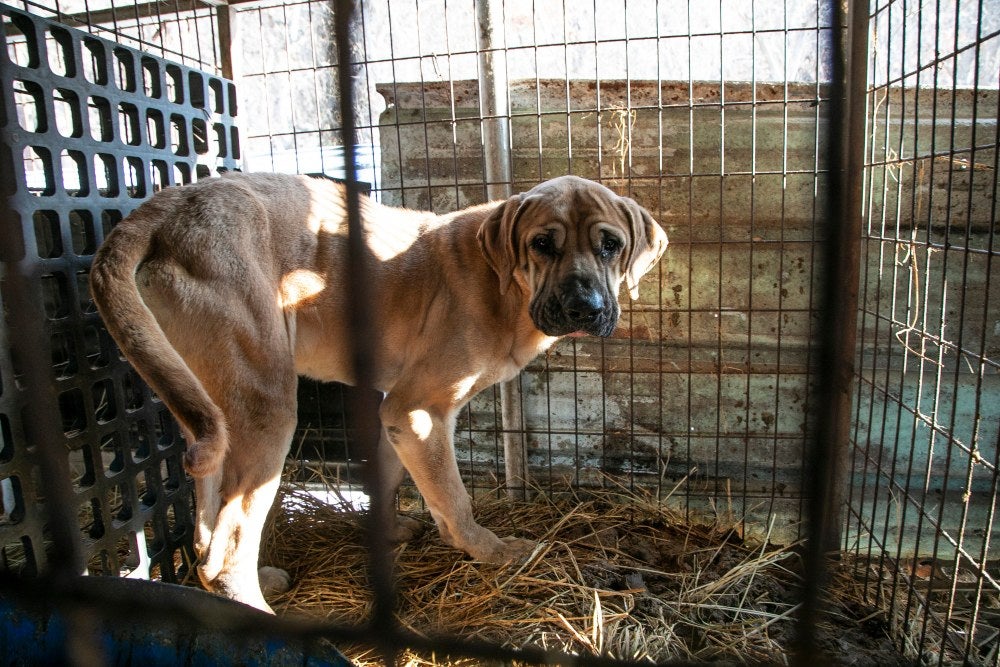
Dalian, CHINA—Chinese animal activists worked through the night with local police in the eastern Chinese province of Anhui to intercept a truck packed with 260 puppies and 22 adult dogs in such appalling conditions that one activist called it a “truck from hell.” The driver of the truck had taken the dogs—all destined to be sold for the meat or pet trade—on a gruelling 1,000 mile journey from Guizhou to Huainan before it was spotted on the highway by local activists. One activist called Teng, an anti-dog meat trade campaign volunteer for Humane Society International and its Chinese partner group, Vshine, quickly responded by alerting the police and coordinating local activists for a rescue effort.
When Teng reported the suspected illegal transport of live animals, the local police immediately despatched law enforcement officers to intercept the truck, forcing it to pull over on the side of the road. Teng reported that when the truck driver couldn’t provide the required documents to legally transport live animals across provincial borders, the dogs were confiscated into government custody where the activists were allowed to provide emergency care. The adult dogs had been due to be sold to a slaughterhouse for human consumption, while the puppies were intended to be sold as pets, although many were so sick by the time they were rescued they likely would also have ended up at the slaughterhouse.
Sadly, conditions were so dire that 12 of the puppies had died by the time the truck was intercepted, and a further 18 died soon after from parvovirus and distemper, both highly contagious diseases that cause severe illness and possible death in dogs. Many of the surviving puppies are suffering from dehydration, starvation and skin disease. One puppy in particular was covered in a painful skin condition leading to hair loss. He was in such a pitiful state, he immediately captured Teng’s heart and he offered to adopt him if he survived. The puppy—who he named Apple—was given emergency veterinary treatment but despite best efforts, he sadly passed away.
Teng said: “My heart sank when I spotted the truck on the highway that night. I knew it was going to be bad because there were so many dogs crammed inside, but I hadn’t expected there to be so many tiny puppies. They were all crying for our attention, covered in their own urine and faeces, and in really bad shape. It was disgusting what they endured, like a truck from hell for those poor dogs. I noticed little Apple right away because he had lost so much fur, and my heart just melted. I wanted to do everything I could to make it up to him so that he could forget his horrible ordeal, but his suffering had just been too much. I dread to think what would have happened to them all, and I’m so sad for all the ones like Apple who didn’t make it. We are grateful to the Huainan police who acted so swiftly to help save these dogs. We couldn’t have done it without them.”
The remaining dogs are now safe, receiving veterinary care, nutritious food, water and rest at nearby shelters. Once their quarantine period is over, they will be transported to Vshine’s shelter, which is funded by Humane Society International. The rescue comes just three months ahead of the mass slaughter of dogs and cats in Yulin, and is a timely reminder that suffering and death at the hands of the dog meat traders is the fate of millions of animals across China every year.
Dr Peter Li, HSI’s China policy specialist said: “This sad story is all too common in China, where hundreds of thousands of dogs and cats every month endure appalling suffering like this in order to make profit for the meat and pet trades. Chinese animal activists regularly alert police when trucks are identified, and in this case the Huainan police were exemplary in how they responded. It is my hope that more law enforcement agencies in China can act in the interests of public safety, public health and animal welfare like the Huainan police. The condition of these dogs was so terrible that it’s likely many more would have died before they reached their intended destination, and sickly puppies would probably have been sold for meat just like the adult dogs. Thank goodness for the Chinese animal activists and police who saved so many lives, and we are proud that that funding HSI provides can make such a difference to animals like this in such desperate circumstances.”
Facts about China’s dog meat trade:
- Most people in China don’t eat dogs, in fact dog meat is only eaten infrequently by a small percentage of the Chinese population. A 2016 survey found that more than half of Chinese citizens (51.7%) think the dog meat trade should be completely banned, and the majority (69.5%) have never eaten dog meat. (Poll conducted by Chinese polling company Horizon, and commissioned by Chinese group China Animal Welfare Association in collaboration with Humane Society International and Avaaz).
- Even in Yulin (where the so-called dog meat “festival” takes place in June every year), a 2017 survey conducted by Chinese state-registered charities and assisted by research staff from the Yulin Municipal Government, shows that most people (72%) don’t regularly eat dog despite efforts by dog meat traders to promote it.
- In 2020, China’s Ministry of Agriculture and Rural Affairs made an official statement that dogs are companion animals and not “livestock” for eating, and two major cities in mainland China—Shenzhen and Zhuhai—banned the consumption of dog and cat meat.
ENDS
Media contact: Wendy Higgins, director of international media: whiggins@hsi.org



